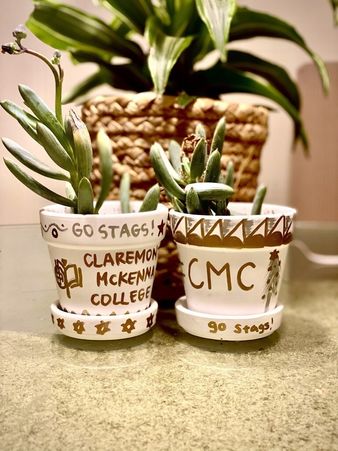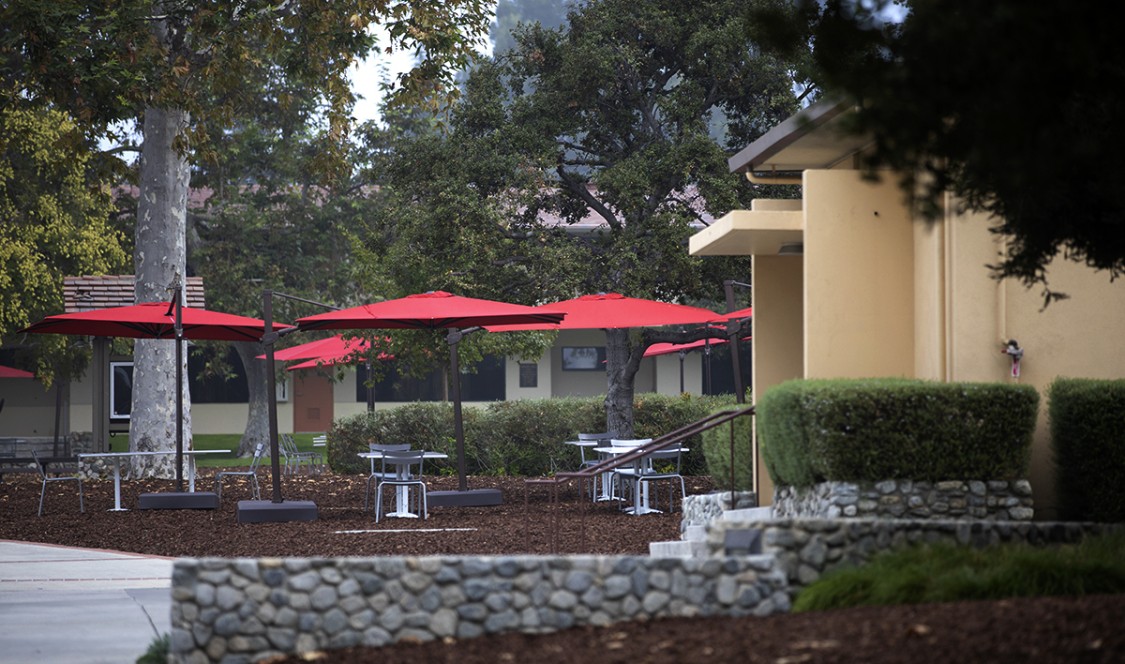Upcoming conversations
CMC community, please watch your inbox for log-in details to these information sessions.
- Student Forums - Friday, December 11th at 8:00am and 5:00pm
- All Staff Q&A Drop-In - Friday, December 11th at 10:00am
- Faculty Meeting - Friday, December 11th at 1:00pm
- Family Forum - Friday, December 18th at 12:30pm
- Senior Students Meetings - Friday, December 18th at 8:00am and 5:00pm
When the spring semester begins in late January, CMC will offer students, faculty, and staff the opportunity to build on a virtual fall semester like no other—all with the hope that 2021 provides a chance for some version of an in-person campus experience.
Guarded optimism for improved public health conditions must wait, however. With record COVID-19 numbers continuing to rise in California, President Hiram E. Chodosh announced Wednesday in a community letter that CMC will have to resume a virtual program for the start of the spring semester.
“Like you, we all remain disappointed that we cannot be together in late January,” Chodosh said in his letter. “However, as soon as conditions and public authorities allow, we are ready to return.”
There remains a possibility that L.A. County could permit campus to reopen through a limited, application-based pilot program or a broader expansion if public health conditions improve dramatically. The College is also tracking the accelerated availability of both vaccines and rapid testing, and their impact on CMC’s ability to bring students back to campus as soon as possible. Until a concrete path to reopening forms, the College is focused on expanding opportunities for strong academic and community engagement in the spring.
For CMC faculty, that means continuing to innovate and redesign courses in ways that will have a long-lasting impact on students. In the fall, professors delivered engaging topics, assignments, group projects, resources, and technological tools to bring a virtual semester to life. In reconstructing their courses, faculty also devised original methods for interacting with students—all with a larger aim of allowing students to interact with one another while apart.
“This is especially important at a time when we can’t physically be together,” said Prof. Emily Wiley, Dean of the Faculty and Interim Vice President for Academic Affairs.
Among the ways CMC will create an exciting, student-focused experience through innovations this spring:
Small group projects
CMC is sponsoring a new series of for-credit seminars and independent study projects for up to six students to work with faculty. Throughout the spring, these small groups will collaborate on complex problems and special issues. “We will support projects that engage with professors’ current research, seminars that explore topics central to professors’ expertise, and small-group independent studies on emerging topics that professors are just beginning to explore,” said Prof. Andrew Schroeder, Associate Dean of the Faculty. While topics are built around faculty expertise, students will play a significant role in shaping the specific research questions they explore. “The goal,” Schroeder said, “is to recreate as closely as possible the classroom interaction that’s central to the CMC experience.”
Expert guest speakers
Faculty called upon outside speakers to virtually visit their classrooms in the fall, presenting students with new opportunities and perspectives. This strategy will be deployed again in spring, with the Dean of the Faculty providing the funding to support expert guest speakers in all spring courses. In the fall, the Gould Center for Humanistic Studies hosted a two-part workshop called “Let’s Write a Pilot” led by writer and producer Matt Pyken ’83, known for Empire and Mr. Robot, and screenwriter Colin Waite. During the first workshop, Pyken gave a crash course in how to write a TV pilot, with students assigned to write one or two scenes. In the next workshop, students learned how the pilot came together and participated in a read-through of the script. Prof. Rima Basu also invited 12 junior and senior scholars to present original work in her advanced philosophy seminar. She asked them to provide a piece of writing that had not yet been published so students could workshop the paper as a class. “There’s something special about getting to meet the person who wrote the paper you just read,” Basu said. “You get to ask the source themselves clarificatory questions, raise objections, and watch the ideas evolve in real time.”
New courses and teaching methods
Taking lessons from the fall, faculty will continue to meet various student needs for online learning. A greater number and variety of courses will be offered at non-standard times, such as evening, to accommodate students in different time zones. Innovations—including newly modeled group projects, discussion pods, creative role-play games, and at-home simulations and laboratories—also featured the best of on-campus personalization with an eye on new, virtual adaptations for enhanced engagement. Prof. Adrienne Martin said she initiated regular one-on-one feedback sessions so her philosophy, politics, and economics students could give her guidance about what aspects of the course were working well for them and where improvements could be made. “My students were creative about ways to cultivate community in the classroom, and insightful about which pedagogical strategies were most effective, and why," Martin said.
Reimagined Athenaeum
World-class speakers and lively discussions on current critical issues will continue through a virtual Athenaeum, which was able to reach the entire CMC community of students, faculty, staff, alumni, parents, and friends in the fall. Upcoming Ath speakers include Raj Chetty, William A. Ackman Professor of Economics at Harvard University, public economist, and MacArthur “Genius”; Stefanie Johnson ’00, associate professor at the University of Colorado Boulder’s Leeds School of Business and author of Inclusify: The Power of Uniqueness and Belonging to Build Innovative Teams; and Richard Lowry, a conservative columnist, author, commentator, and editor of The National Review.
On the community engagement front, the Dean of Students office and other departments across campus are planning to expand a broad array of successful programs from the fall. Staff and faculty have helped students find new ways to experience clubs and organizations, competitive events, service experiences, and creative ventures, said Dianna “DT” Graves ’98, Associate Vice President and Dean of Students. The Associated Students of Claremont McKenna College and the College Programming Board also will continue to collaborate on a vibrant schedule of spring programs.

“This is a group effort. CMC faculty and staff choose to be at CMC because we love working with students,” Graves said. “These last few months have been some of the most challenging of our professional careers, largely because we miss our students terribly and want the best experience for them. We are committed to doing all we can to support students this spring and to help them create memories they will cherish forever.”
Among the ways CMC will offer opportunities for shared experience, student growth, and close-knit community this spring:
Enhanced virtual programming
Through a new initiative, supported by the Dean of Students office and the Soll Center for Student Opportunity, CMC will work with students to “bring a bit of Claremont to wherever they might be this spring,” Graves said. Focused in the areas of Community, Purpose and Play, programs will partner with faculty, staff, and student leaders to help CMCers build connections and develop both personally and professionally. Specifics will follow in early 2021. “The toughest part of the fall was trying to understand how to translate the CMC experience in a virtual setting,” Graves said. “With the fall under our belt, we feel that our spring programming will be more effective, inclusive, and creative.”
Mystery Box program
In the fall, students working for Devon MacIver, Associate Dean for Student Engagement, curated mystery boxes that were sent to students across the world. In the “friendship box,” students received art and craft supplies, along with forwarding postage, to create something they could then send to a friend. More recently, nearly 300 students signed up for the “garden box” and received pots, paints, and succulent clippings from the CMC campus to bring a piece of Claremont into their homes. Later this month, a “baking box” will go out with cookie decorating supplies. “We heard from students that they wanted opportunities to engage on their schedule and away from the screen,” MacIver said. “This is the reason we put together the Mystery Box program—a way to get creative supplies in the hands of students, to use on their own time.”
EngageCMC
A new multipurpose platform, EngageCMC, will feature an expanded alumni directory, career networking and mentorship opportunities, and collaborative tools for student support and community-wide interest. The personalized CMC networking tool will launch in late January.
WHOOP pilot
Students were excited to pair WHOOP, a personal readiness and fitness strap/app, with the Success Consultant program in order to promote greater responsibility of health and wellbeing in the virtual fall. Some key focus areas: improving sleep and exercise habits; avoiding stress and burnout; reducing alcohol, caffeine, and other substance use; developing healthier nutrition and hydration habits; and fostering a stronger sense of community, accountability, and care. As a bonus, WHOOP also features early detection capabilities via respiratory rate that can reduce COVID-19 spread. The pilot, and its student testimonials on improved habits, will continue to inform spring platforms.
Class of 2021 planning
The College is exploring options with student leadership and families to maintain an in-person commencement for the Class of 2021. Two focus groups are scheduled for December 18th to start conversations with seniors about hopes and potential plans for the spring semester. These initial discussions will inform a working group of interested students to “shape the most memorable spring semester possible given the circumstances,” Graves said.
Several more information forums (see sidebar) will be held this month, with invitations forthcoming, to advance CMC’s spring semester. For additional details on the College’s spring semester plan, please visit the CMC Returns website or email [email protected].
—Thomas Rozwadowski, Gilien Silsby, and Anne Bergman
* This story has been updated to reflect the cancellation of the CMC in London program due to COVID-19 restrictions in the U.K.

